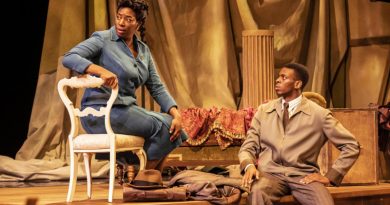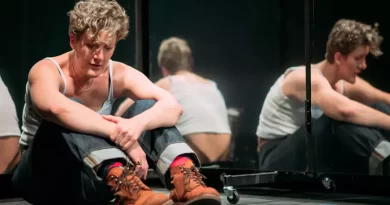“My Master Builder” at Wyndham’s Theatre
Jane Edwardes in the West End
4 May 2025
The poster for My Master Builder – as opposed to The Master Builder – centres on Ewan McGregor with Elizabeth Debicki and Kate Fleetwood looking warily behind him. It might be the illustration for a romantic story in Woman’s Own. At times, that’s not an inappropriate description of American playwright Lila Raicek’s first West End play.

Set design by Richard Kent.
Photo credit: Johan Persson.
How to explain the relationship of her play to Ibsen’s original? Director Michael Grandage has described it as a conversation, rather than an adaptation or a version. The two pieces share something in common since they are both partly autobiographical. Ibsen’s play is based on an affair he had with a much younger woman. Raicek describes going to dinner with a warring married couple and feeling like a pawn in their marital game. Ibsen’s framework is there, but the characters are very different. Raicek has taken The Master Builder and shifted the spotlight off the builder and on to the builder’s wife.
McGregor is Henry Solness, a “starchitect”, living in the Hamptons, New York. He and his wife Elena are hosting a reception to celebrate July 4, and Henry’s reconstruction of an old whalers’ church, which burnt down ten years ago, the same year that their son died. Richard Kent’s glass and aluminium set suggests both the building and Henry’s elegant home with a view of the sea fringed with reeds. Within these enviable surroundings, disappointment and betrayal festers.
In working on the church, Henry is tipping his hat to the past, explicitly stating that “memory is the key to my work”. The past matters for Elena, too. Ever since their son died, their marriage has soured. Far from being the duty-bound, repressed wife of Ibsen’s original, Elena is the dynamic, outspoken head of a publishing company, a professed feminist, but one who doesn’t always support her female colleagues. As Elena, Fleetwood dominates as she lashes out in all directions. It is Elena’s idea to invite Debicki’s Mathilde with whom Henry was once infatuated. It is also her plan to seduce Henry’s protégé, Ragnar, and to announce her intention to divorce Henry. We are clearly in for a bumpy ride.
At first, Henry, improbably, doesn’t recognize Mathilde. According to Elena, she was not the only pupil with whom he became close, exploiting his role as a teacher. Elena, however, also abused her power, “slut shaming” Mathilde and forcing her to give up architecture and follow a different line of work as a journalist and a novelist. Her new novel, not yet published, is called The Master and is based on her relationship with Henry. Once more, it is Elena who has the power to make sure it is never published.
Inevitably, Henry falls for Mathilde again. Debicki is beautiful in her shimmering, silver evening gown but doesn’t have much to do. She looks untouchable, like a model on a catwalk. She might awaken in Henry his youthful idealism, but it is clear that their relationship is a fantasy, one that has devastating results.
Apart from the sometimes stilted dialogue, the main problem with the play is that Henry has none of the charisma, power, or complexity to make him interesting, nor is his relationship with the two women at all compelling. It’s not McGregor’s fault that he seems like a very ordinary man, certainly not the kind to go climbing towers to impress an ex-student. It is hard to understand why Elena and Mathilde are so obsessed with him.
David Ajala has fun as Ragnar, an ex-pupil of Henry’s who the master now sees as a rival. Ragnar oozes the confidence that Henry appears to lack, happy to flirt with Elena, while secretly sleeping with Kaia (Mirren Mack), Henry and Elena’s assistant.
The play runs for under two hours and the time passes swiftly enough. It is hard, however, to understand what attracted Grandage to it originally. He is one of our most perceptive directors and I would so much prefer to see him tackle Ibsen’s original and attempt to overcome the challenges that that play undoubtedly presents. This is not Grandage’s best work. A few supernumeraries do not create a party atmosphere, nor is there much sense of the play reaching its climax. Although the production is lovely to look at, it’s a not very illuminating play about the disappointments of middle age and temptations of adultery – a throwback to what used to be thought of as traditional West End fare.









